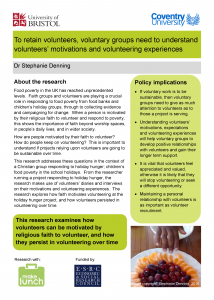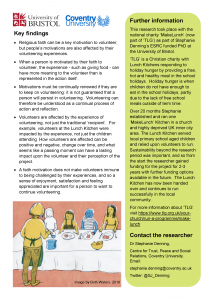Life on the Breadline Research Fellow, Stephanie Denning, attended Street Games’ Fit and Fed holiday hunger roundtable in Parliament on 4th December 2018. Here Stephanie shares her reflections on the day.
Holiday hunger is when children do not have enough to eat in the school holidays. The APPG on Hunger has estimated that there are 3.2 million children in the UK at risk of holiday hunger – 1.2 million who have free school meals and are without these in the school holidays, but a further 2 million children who are not eligible for free school meals and are at risk of hunger throughout the year. Holiday hunger affects adults as well as children: in 2015 Kelloggs found that one third of parents in low income families had skipped a meal in order to feed their children.

There are a number of charities and organisations working across the UK to respond to holiday hunger. One is the Fit and Fed initiative in StreetGames which launched in 2016. Over summer 2018, Fit and Fed schemes took place across 233 delivery sites and served 146,260 meals. On 4th December 2018 Street Games hosted a roundtable discussion in Parliament on holiday hunger, chaired by Baroness Sater.
The roundtable began with Jane Ashworth OBE from StreetGames outlining some key points for discussion which StreetGames had concluded from their work in responding to holiday hunger. These included the need for the government to own the problem, for collaboration in responses, and for responses that provide nutritionally valuable meals. Ruth Smeeth MP for Stoke-on-Trent North and Kidsgrove added to Jane’s thoughts by placing emphasis upon food saying that “Food is love” and reminding the group that “It’s about children, people, families and what happens to them in the long-term” – for example being hungry in term time and/or the school holidays can impact upon a child’s attainment at school as well as their health.
 Over the next 90 minutes the group discussed a wide range of issues around holiday hunger including the provision itself, project sustainability, and the activities alongside food. Professor Greta Defeyter raised the important point from her research at Northumbria University that what children eat at holiday schemes is important because having a meal does not necessarily in itself impact upon food insecurity and diet – what is eaten and how often makes a difference.
Over the next 90 minutes the group discussed a wide range of issues around holiday hunger including the provision itself, project sustainability, and the activities alongside food. Professor Greta Defeyter raised the important point from her research at Northumbria University that what children eat at holiday schemes is important because having a meal does not necessarily in itself impact upon food insecurity and diet – what is eaten and how often makes a difference.
Several participants addressed the question of stigma in holiday hunger provision. Joy Cowley from TLG MakeLunch, which has been addressing holiday hunger since 2011, emphasised the importance of the local community being involved in projects in order to address stigma. She shared how MakeLunch kitchens often involve parents in the food preparation as not only can this translate to changing food practices in homes, but it also gives parents the opportunity to participate in the project and have a sense of ownership.
In terms of project sustainability, the group recognised that volunteers are often important in holiday hunger provision. My research with TLG MakeLunch at the University of Bristol found that volunteering can be understood as a continual cycle of motivation, action, and reflection. This means that it is important that project leaders understand their volunteers’ motivations and reflections if they are to retain their volunteers, which ultimately will help project sustainability. In responding to holiday hunger it is therefore important to consider the volunteers as well the children that the project is responding to. The policy briefing below explains these ideas further:


Policy briefing: To retain volunteers, voluntary organisations need to understand volunteers’ motivations and volunteering experiences
Another participant in the discussion related project sustainability to knowing what different outcomes could be expected from holiday hunger provision, because then we can know who all the stakeholders are, for example, schools, the NHS, community cohesion, and people’s economic prospects.
The roundtable ended with the group agreeing over a need for future collaboration to bring together providers, health advisers, and other experts.
A take-home reflection from the discussion for me is the need for activism alongside provision – we need to question how and why holiday hunger exists in the UK today as well as responding to it. Combining provision with activism will provide a way to address the root causes of holiday hunger, and ultimately end hunger in the UK which is the goal that many providers work towards.


